International Women’s Day 2023 is here — and we are embracing the opportunity to uplift and empower women within our ecosystem and beyond. With so many incredible partnerships professionals within the B2B SaaS industry, we are thrilled to inspire the space with the excellent work these women are doing every day to lead partnerships.
The theme for International Women’s Day this year is equity. We’ve recently debunked the myth of equal opportunity and now we’re focused on creating equitable opportunities more than ever. As with many other systems and institutions, we recognize that the gender gap is real and women continue to be underrepresented (especially in leadership positions) — and while it’s getting better out there for women in the workforce, there is still a lot of work to be done.
We know that for tech-related jobs, women currently hold only 26.7% of the positions, according to Statista — following the percentage of women in tech-related careers declining in the last two years. This shouldn’t be too surprising as more than 50% of women in tech report gender inequality, discrimination, or sexual harassment in male-dominated environments. According to Builtin, 66% of women report that there isn’t a clear path forward for them in their careers where they currently work. In addition to all the explicit and implicit bias women experience in the tech workplace, they’re also 22% more likely to experience imposter syndrome.
These women are the ones paving the path forward — walking it, experiencing it and being able to speak to it — for every woman and partnerships professional who dare take it on next.
Being a woman can mean so much, and perceptions of what one is and how she behaves can be a burden we secretly carry (if you know, you know). This doesn’t change when we enter the workplace, it doesn’t stop at B2B SaaS. But we have an opportunity — tech is new, the partnerships industry is fresh, and we can get it right from the start. It’s 2023 and we can be on the right side of history — listening and learning from these trailblazing women who are defining women leading partnerships.
Featured women leading partnerships:
Partner leader: Madelyn Wing, Director of Partner Marketing at CallRail
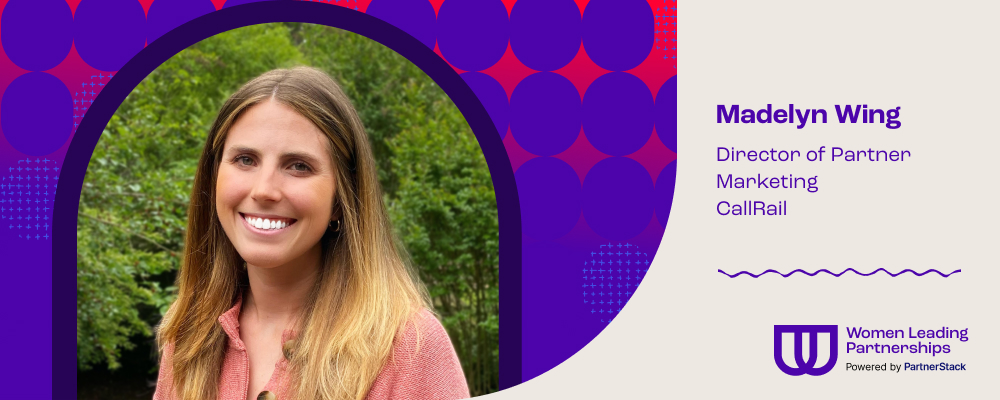
As Madelyn Wing points out, no one goes to university and majors in partnerships, yet. This partner marketing director understands that these roles require training and experience while being on the job to get right. With almost half a decade of experience in the partnerships space, she’s seen the norm go from scrappy with minimal resources to a relationship-strong industry filled with great resources and associations to support the good work happening between partners. “Just seeing how PartnerStack has grown, I think it really speaks to companies in the tech space,” says Wing. “Understanding the value that partnerships can bring to their organizations, which I don’t think has really always been the case until recently.” Wing understands the distinction between being a “partner on paper only” with a lot of talk — and believes a big thing women bring to the space is an ability to identify unique values and make partnerships happen with a mutual benefit for both orgs. “Women tend to be born project managers that know how to weave in a lot of that invisible work that’s not on paper into this space to strengthen the work,” says Wing.
Biggest accomplishment: Having done the boots-on-the-ground partnerships work, Wing’s ability to do work well while taking on a leadership position and growing her team has been something she’s valued. “I was a one-man band for about eight months,” she shares, understanding you need to plant roots before you grow. “Bringing in Bailey — and I have two other team members now on my team — and just seeing them grow and get really ingrained with CallRail — it really warms my heart,” says Wing, happy to see the development of her team. “I love helping to give them a platform for their career and grow. Mentorship is huge.” And, in the partnership space, mentorship is key to developing the understanding and knowledge base required to really succeed.
Challenges women in partnerships face: Within partnerships and beyond, Wing notices an inherent difference between men and women in the workplace. “Men are just, a lot of times, a lot more confident and not afraid to take a risk,” Wing observes. “Whereas women may be dissecting their brains [for] everything that could go wrong. Should we or shouldn’t we?” She applauds men for this mindset — wishing more women could lean into it too — while recognizing that the risks often are greater for women as there’s less margin for error. Another struggle for women comes from being taken seriously and granted the appropriate authority. “It can be really hard, I think, if you’re the only woman in the room to be taken seriously — no, this is my project,” explains Wing, representing decision-making women across the workforce. “Being confident and able to stand strong — and making it known your role is really, really important [and] to be taken seriously — because otherwise, you can very easily fall to the background of things when that isn’t really how it should be.”
Why we need more women in partnerships: Wing sees an opportunity to shift the narrative for women — a chance to build more confidence within. Through the lens of partnerships, Wing explains that often, people from multiple teams at different orgs are trying to work towards one goal. “When you’re working with someone that you don’t work closely with, ‘cause they’re from another organization, I think it can be hard sometimes, like stepping on toes, who’s actually doing what and so on,” she says as she paints a picture of a common partnerships hurdle. “Having someone that can read the room a little bit better in the room is good because they can help. As a woman, we can help shift the conversation of, like, oh no, this is not going the direction that we need it to to, let’s level-set here. Whereas someone else might dig the hole further away from where it needs to go.”
Who we should pay attention to: Nancy Mai Harnett of HubSpot, Adrienne Coburn of Oyster, the all-women partnerships team at CallRail, and Bailey Beckham of CallRail, who will be a panelist at Women Leading Partnerships event.
Advice for women in partnerships: “The number one piece of advice is just to continue to insert yourself, which I think is another thing, right? As a woman, it can be kind of daunting because you don’t want to come off as, you know, this snobby, nosy woman that is poking around in other people’s things — which is not what you’re trying to do at all,” offers Wing, who believes partnerships are critical to a lot of businesses in 2023. “You’re really trying to say, ‘hey, I promise I can be helpful.’ And, so, you have to keep doing it. It’s so important. And like I said, it will pay off.”
Related: 10 skills any partnerships manager should have to succeed.
Partner leader: Kelly Sarabyn, Platform Ecosystem Advocate at HubSpot
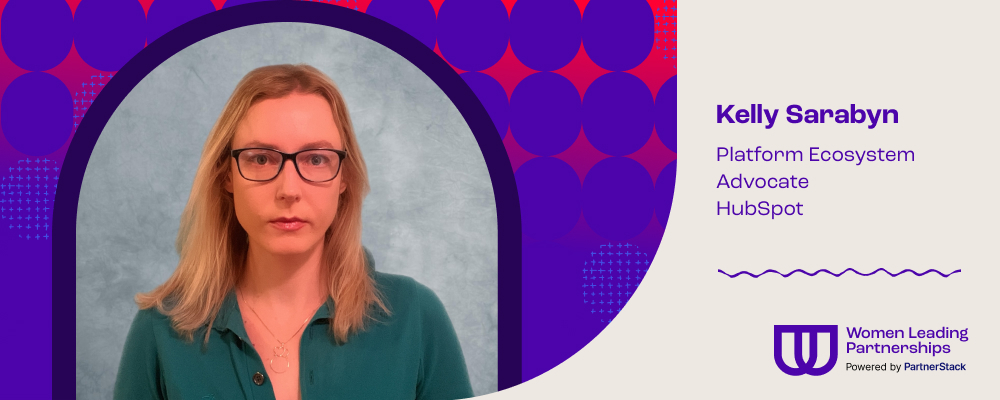
Beyond her main role at Hubspot, Sarabyn co-leads Women in Partnerships at Partnership Leaders, a San Francisco-based think tank for accelerating success for partnerships teams. She’s a member of Cloud Software Association, the biggest SaaS partnership network that deals with resellers, distribution and more. On top of all the leadership she provides to the space, she also carves out time to pen thoughtful pieces around ecosystems and lends her voice to panels and webinars across the industry.
Biggest accomplishment: Sarabyn speaks of content and the production of it as her first love — and is proud to hang her hat on two specific reports she’s worked on. She spearheaded The State of Partner Apps and Programs in 2022, which boasts thorough research and sources, and she pulled it off by rounding up 10 executives leading ecosystems. She’s also produced a report on 400 SaaS companies at different stages — broke down the number of integrations available, spoke to whether they had marketplaces, dug into what their APIs were and ultimately hunted down what the largest in SaaS did with their series of funding.
In addition to the reports, she leads tech partner enablement and advocacy. Previously, she ran marketing at Pandium, an embedded iPaaS. She also crafted positioning for B2B companies like Redis Labs, stensul, EchoNous, and Recleim while she was a partner at Woden, a branding agency. She believes companies that leverage partnerships and ecosystems can drive more revenue and build stronger brands.
Challenges women in partnerships face: As the co-lead for Women in Partnerships, Sarabyn recognizes the disparity when it comes to leadership. “Over 80% of leadership development are still men,” says Sarabyn, who believes a fairness issue is sometimes at play, noting that women can be victim of being underpromoted. “Great talent doesn’t [always] get rewarded.” She points out that there are great women leaders in partnerships — but the challenge can be breaking into the ‘old boys network’. “It is very real,” she explains, calling out the vibe. “Men may be hanging out — talking a certain way.” Sarabyn also notes that there are biases within VC firms often put forward in the pitching process. All of this is directly related to the work without even touching on the fact that women disproportionately take on child-rearing and other domestic responsibilities at home — especially during a time when work from home has been reigning.
Why we need more women in partnerships: To counter the fairness issue, we first need more and better representation of women in the space. According to Sarabyn, women in partnerships are actually performing well — but may be underpromoted. She believes that there’s a win-win — women make good leaders and know what they’re doing when it comes to the work. Having more women represented in the industry will help fight biases and stereotypes as we pave the way for future generations of women in partnerships.
Who we should pay attention to: Jessie Shipman of Fluincy, Cristina Flaschen of Pandium, Jaimie Fucillo of Mindbody, Michelle Ragusa-McBain of Cisco, Joni Deus of Mailchimp and Jennifer Ritchey of Vena Solutions.
Advice for women in partnerships: For those just starting out in partnerships, Sarabyn has pointers to support success. “Take advantage of content and community,” she says, encouraging women to join Slack communities and Cloud associations. “In general, partnerships people are very willing to meet. Find someone you want to meet. Don’t be shy.”
Related: The best partnership ecosystem learnings in 2023.
Partner leader: Sarah Bundy, Founder & CEO at All Inclusive Marketing
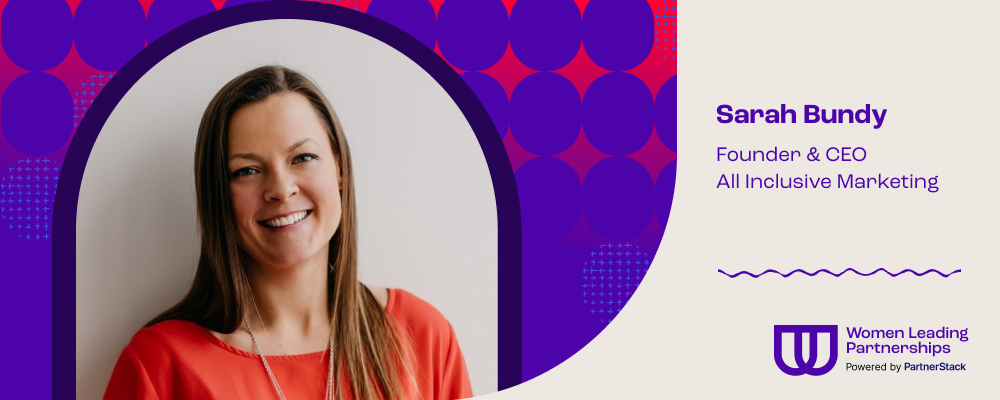
This Vancouver-based, award-winning, digital marketing thought leader has earned titles like Top 40 Under 40, made lists as a strong Female Entrepreneur in Canada and offers mentorship and advice throughout the industry. From ecommerce startups to fast-growth companies, Bundy has more than 20 years of experience in marketing, business and technology. On top of this, she has her own website and blog that supports knowledge on affiliate networks and tracking platforms. After all, when she started, social media, mobile and apps weren't a thing yet — and she is optimistic about the incredible potential in partnership marketing and the ability to combine creativity, relationships, analytics and data.
Biggest accomplishment: Bundy is wildly generous with her experience and knowledge — she mentors many women, from students to female founders and beyond. “I love helping young people, inspired people, women in business,” says Bundy. “[It’s] a big part of my give-back philosophy.”
Challenges women in partnerships face: Looking ahead, Bundy is excited about the next generation of women leaders coming in. She also acknowledges there can be a gap when it comes to skill. She is optimistic about their intelligence, vision and grit. “I do know there’s a gap in regards to experience and opportunities,” she says, thoughtfully considering the limitations of roles. But she believes the lack of experience and exposure for women can be countered by getting mentors and strengthening competency when it comes to skills, negotiation and financial literacy. She also notes that sometimes having a male mentor can make a difference in the space — and she attributes much of her success to the male allies that have supported her throughout her career. When it comes to challenges, she’s also real about the challenges of work/life balance. “Women are caregivers, mothers, family members — [taking on] caregiving responsibilities,” says Bundy, who also notes they typically take on managing mental health and wellness. She thinks women can be supported, though, by giving them opportunities to grow and thrive — rather than always tasking them with note-taking and admin work. She believes women can strategize and make hard business decisions.
Why we need more women in partnerships: For the industry, she notes partnerships is one of the few industries with a fairly even split when it comes to gender in the workforce. Of course, she also points out there is room for growth in leadership roles. “Require female workforces with a different perspective,” says Bundy, who addresses the fact that women often make great project managers with their unique problem-solving skills.
Who we should pay attention to: Lee-Ann Johnstone of Affiliate Insider, Alex Forsch of Awin USA, Sara Malo and Amanda Farris of LinkUnite, Rosalind Gardner (author of The Super Affiliate Handbook), Missy Ward of Affiliate Summit, Tricia Meyer of Sunshine Rewards, Carolyn Tang Kmet of ShareASale and AIM, Judi Moore. Male allies to shoutout: Jim Nichols of Exclamation Marketing and Adam Ross of Awin.
See also: I run a successful partnership program and these are my top tips.
Partner leader: Jennifer Rhima, Director of Partnerships at Apollo.io
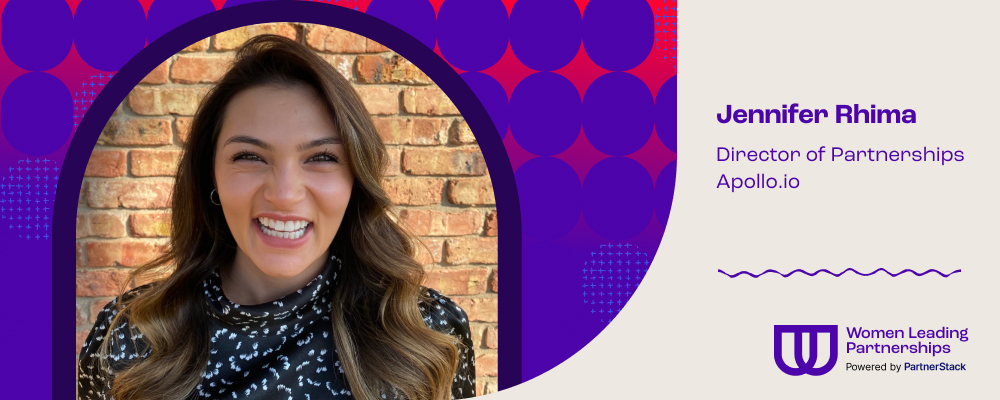
Texas-based partnerships leader Jennifer Rhima has more than eight years of experience, from travel and fintech to banking, SaaS and beyond. A member of Partnership Leaders, Rhima has partnerships experience that goes beyond North America — this globetrotter lived in Dubai for nine years and has boots-on-the-ground experience that supports her knowledge across borders. “When I started working with Apollo, I started noticing the community around partners,” says Rhima, who moved home to the United States last year. “The partnership community here in the US is like nothing I’ve seen before.” Rhima is the kind of partnerships leader who leads by example — providing positive representation for women in partnerships around the world.
Biggest accomplishment: The thing about Rhima is she’s a strategic, scrappy, self-starter who is unafraid of getting her hands dirty. “I’ve always started partnerships from scratch — and I think the respect that I earned from starting something from scratch and actually proving that it works — has made me proud,” shares Rhima, who started partnerships in Dubai and grew a team to four people. Her curiosity and passion for learning has fuelled her partnerships career; she takes pride in her ability to ask the right questions. Her years of experience in the space came in handy last year when this one-woman partnerships team ignited a 1,641% increase in average partnerships revenue for Apollo.
Challenges women in partnerships face: Rhima has identified an opportunity for women to speak up more in the space — for both recognition of efforts and more partnerships potential. “If you look on LinkedIn, partnerships people in general are sharing so much about the partnership space — how to be successful, sharing tips. I have noticed a lot of those are men,” observes Rhima. “I feel like the men are very outspoken — I don’t know why that is. And, you know, it’s a shame because I feel like there’s so many women doing incredible stuff in partnerships. Maybe they’re just not sharing it, right?” She also offers the unique perspective of partnerships around the world. Thinking back to her time in the Middle East, she notes her experience in partnerships sometimes operated differently there. “One of the things that I’ve faced if I’m leading partnerships [is that] there are some partners who still believe they need to go to a man to work with,” says Rhima. “If they want to get something done, they want to work with somebody who’s in a higher level or just because. [But] they’re dealing with me, who’s a woman. So, I think one of the biggest challenges is, no, I’m actually leading our partnerships. You know, standing up and saying, ‘hey, I’m actually the one you’ll be working with’.” Standing firm onyour position, strong in conviction and inserting yourself in conversations is how Rhima counters challenges women may face in partnerships — which is, unfortunately, prevalent across many industries. Folx like Rhima are paving the path for future generations of women who will eventually be in her shoes.
Why we need more women in partnerships: “I don’t think it’s the partnership space that needs more women — I think it’s the tech industry,” says Rhima, who is an advocate when it comes to supporting women in tech. She also emphasizes the need to shine a light on all the women currently in partnerships. “I think the partnerships women are there — we just aren’t seeing it.” Rhima also encourages more collaboration with open-minded male allies. “It’s not men versus women — I think it’s us collaborating together,” suggests Rhima, who thinks supporting each other will matter more than ever in 2023. “Partnerships have always been important, but this year there’s a bigger focus — partnerships are relationships.”
Who we should pay attention to: Alex Hollywood of HubSpot, Jillian Trubee of Remote, Mattea Kilstofte, Jessica Casler and Aseel Al Qutob.
Related: Sign up to get partner resources sent directly to your inbox.
Partner leader: Elisa Reggiardo, Partner Marketing at Slite
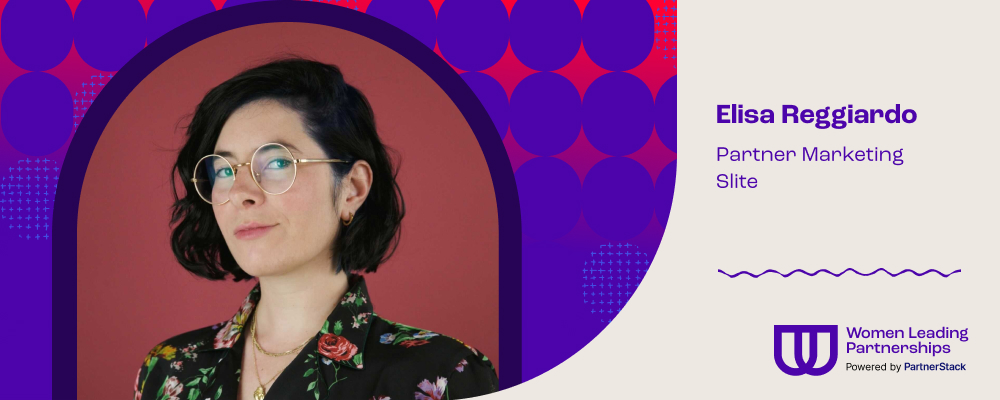
Before Elisa Reggiardo took on partnerships, she started her career as a prima ballerina doing classical ballet. It wasn’t until her injury while attending a Russian school in Brazil that she started to pivot her path. From customer support to marketing, Reggiardo tried on different hats. She already spoke German Portuguese and English, and authored a book called Undefined World to capture the complexities of the career path in the modern world born from her own experiences.
Biggest accomplishment: This isn’t Reggiardo’s first time running partnerships, although she is newer to the partnerships space in an official capacity. She has no ego when it comes to learning — going from CMO to entry level. “Getting very good at something is better than a title I can get,” says Reggiardo, who understands folx aren’t open about this. “Mentors and leaders who have these types of titles on LinkedIn — I just want to get very good at something — it’s OK to change titles.”
Challenges women in partnerships face: When it comes to executing in partnerships, Reggiardo speaks to perception. “There is a certain bias, it replicates within the ecosystem. I see women having to pave the way a little more purposely — to actually build their space and claim it,” says Reggiardo, who feels this needs to be done to be considered owners of the ecosystem. Gender bias, lack of representation, stereotyping and the challenge of balancing work and personal lives are other challenges on the list — and she notes a need to overcompensate because of the lack of representation. This partnerships leader believes being aware of the challenges is key to countering them, and one of the ways it’s done best is through seeking mentorship and confidence-building. Of course, certain situations can be tricky to read. “Is it because I’m a woman or is this person just an asshole? Only women can understand facing these challenges — why you’re not being taken seriously, why you’re not being heard,” says Reggiardo.
Why we need more women in partnerships: Beyond women, Reggiardo believes what partnerships really needs is diversity and awareness of those things. “Data is biased — [it’s] why you need women involved in building an algorithm. Otherwise, [it’s] very one-sided,” explains Reggiardo, who believes diversity is also key to improving decision-making. “Data being biased — it applies to partnerships.” She calls for better representation to support the work, understanding opinions, backgrounds, genders — instead of repeating the same equation over and over again. “We make up for half the population — selling the other half shouldn’t be quantum science for why it’s important,” says Reggiardo.
Who we should pay attention to: Adrienne Coburn of Oyster, Joni Deus of Mailchimp, Liz Sheldon of Pleo and Jennifer Rhima of Apollo.
See also: What you need to drive distribution revenue this year.
Partner leader: Luisa Gröger, Partner Manager DACH & Commercial ISV Lead at Sana Commerce
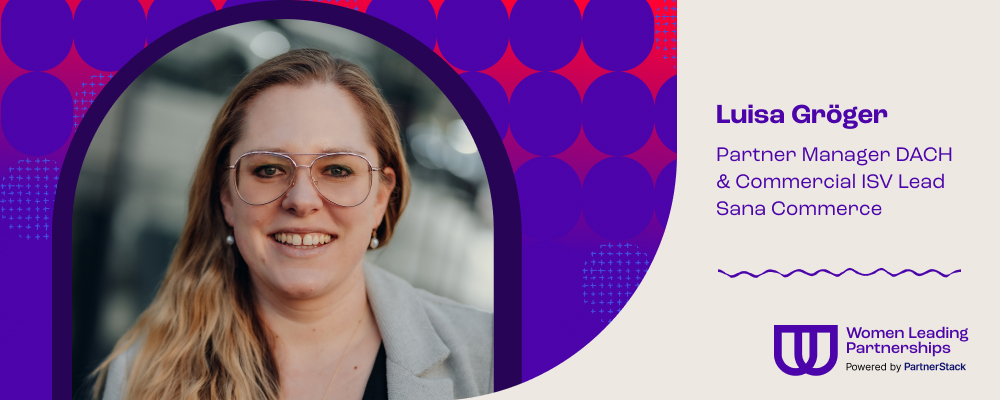
With a background in hospitality and luxury travel, this partnerships leader has the people skills required to level up work in the space. “That’s what I’m doing — I’ve connected one person to three other people in the same space where I don’t have immediate benefit from the connections,” says Gröger, who takes pride in important introductions that support mutual growth. “My impact is connecting the dots — the outcome is inevitable. It’ll come back to me… they’ll mention [it] in one way or another.” And, they do. This is how she’s gained opportunities for campaigns, events, introductions to other key colleagues in the partnerships world and more.
Biggest accomplishment: Back in 2022, Gröger discovered a gap which resulted in a lucrative opportunity for her company. Within Sana, despite the organization having a headcount of 600, there was no one commercially responsible for technology partners. Leads were being lost, no one working on the relationships and money was falling through the cracks. Combining tech partners with implementation partners in a single role, Gröger built a business case and convinced decision-makers of the potential for her partnerships vision. She got herself promoted, took on the new role and has been scaling and growing since.
Challenges women face in the partnership space: Gröger is real when it comes to challenges she and other women may face in the space. Doing partnerships work out of Germany, she acknowledges the dominant folx in the space are ‘middle aged white men’ and even notes, “My advantage is that I look German and I have a German name — it would be a problem if I didn’t.” She explains that working with some more traditional partners in their late 40s and early 50s can come with some additional bumps in the road. “When they speak to you the first time, they think you don’t know what you’re talking about,” says Gröger, who continues to find ways around this default setting of some of the challenging partners. “What we need is to find another way of speaking to them in a friendly way. Second or third convo, they realize that we do know what we’re speaking about. They respect you and that’s fine. It’s the start that’s really difficult,” she says, focusing on the fact that the aim of partnerships is to build long-lasting relationships. “I need to be OK with being a charming female to win that trust until I can prove that I technically also know what I’m talking about.”
Why we need more women in partnerships: Beyond women, Gröger is calling for more diversity in tech to support a more holistic outcome. “In your garden, when you plant only carrots for years and years and years — the outcome will not be as great. If you diversify the plants you grow, everything will profit,” she says, noting more offerings and opportunities. She believes there should be a minimum number of women on boards and wants to move away from gender and focus on actual achievements and skill sets. “I’m building a women’s network like-minded women. The golf guys will retire and it’ll be our time to shine — so we better be ready,” says Gröger.
Who we should pay attention to: Laura Kiley of Avalara, Nicky Untung of inriver and Karolina Najdek of DataArt.
Advice for women in partnerships: “Try not to fight back every time. Choose your battles, find your own lines, embrace the position as supposedly ‘the lower sex’,” says Gröger, “Turn that around!”
You may also like: Red flags to watch out for when recruiting partners for your program.
Partner leader: Aidan Weinrib, Head of Partnerships at WizeHire
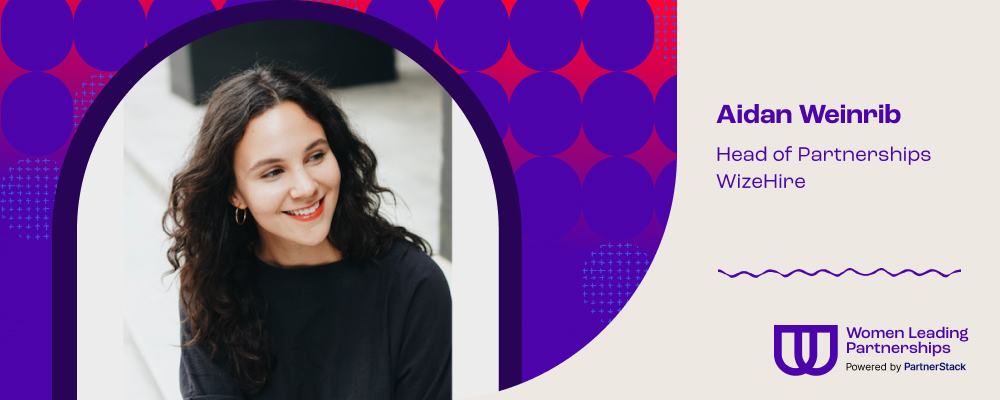
With a seven-person headcount on her partnerships team, Aidan Weinrib lives for doing, building and community, which makes sense as the head of partnerships at WizeHire. Weinrib’s endless curiosity has led her to a series of opportunities and her strategic mind has helped connect the dots necessary to get creative when it comes to partnerships and driving success. Now, she’s mentoring women to empower them to take on the partnerships space with confidence.
Biggest accomplishment: With an all-women partnerships team for a year, Weinrib built, trained and introduced women to partnerships. “I’ve started mentoring two women this year and helped them start partner programs — and they are more confident in taking up space and making requests and building revenue through partnerships,” shares Weinrib, who embraces leadership in the space and is proud of how rapidly they built revenue, growing 550% in a year.
Challenges women in partnerships face: Weinrib loves to do and create impact. Challenges include how complex partnerships can be and how much work goes unnoticed and, of course, imposter syndrome. Though, for those dealing with daunting feelings, Weinrib has a hot tip. “When there’s these moments of ‘is it possible for me to do this’ the only thing that really, really helps me [even] if I haven’t done it before’ was seeing how many people were also winging it and not doing great,” she admits, acknowledging how hard it can be to do things for the first time and the fact that women often feel they need to be excellent. “You can name the stuff you don’t know and you need extra support on, but I learned this and believe it: just because you’re new at something doesn’t mean you’re bad at it. It means you’re not as good as you will be.”
Why we need more women in partnerships: In Weinrib’s experience, women are open to speaking with each other. “95% [of women in partnerships] are super impressed with your career,” she says, believing they’re down to talk and look for other people in the space to form stronger partnerships. In this people-oriented field, Weinrib also speaks to the high standards women have in the workplace. “How they treat people within teams,” she explains, acknowledging a lot of the invisible work women can take on from both achieving success while approaching the work and people with empathy. “Vision for what good looks like and how to get there — thoroughly.” She is optimistic about this upcoming year, believes partnerships will be a strong tool for profitability and rich ecosystems will stay relevant. “Partnerships have always mattered. People haven’t figured out what that means — in 2023, people are really understanding the impacts partnerships have and what other partners are looking for.”
Who we should pay attention to: Kaitlyn Louvier of FreshBooks, Maureen Little of Okta, Charlene Strain of Constant Contact, Maritza van den Heuvel previously of Thinkific, Jaimie Fucillo of Mindbody, Briana Strauss of Zapier, and Mary Vue of Syncari.
Advice for women in partnerships: “If you are curious about starting in partnerships, it’s a really great avenue to be creative,” says Weinrib, who got into partnerships because sales felt too repetitive. “Partnerships is extremely meta in that everything is about relationships, externally, internally, across different teams that you don’t have official partnerships with. It is so much about who you can interact with and what value you can contribute to.”
See also: Sign up for our newsletter.
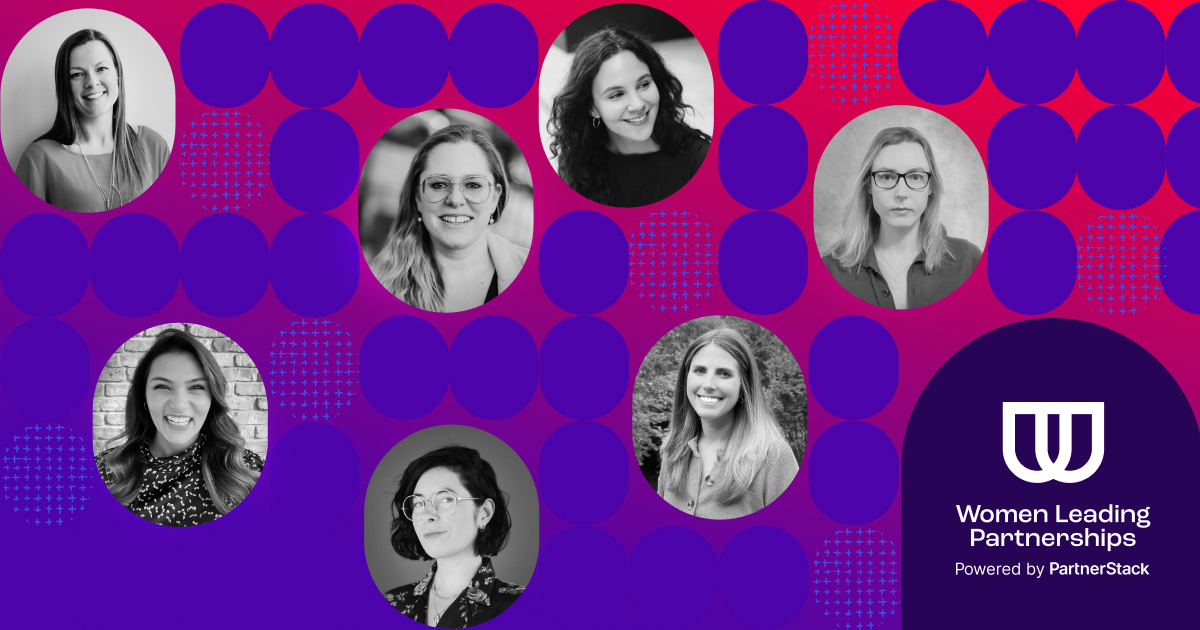







.jpg)


